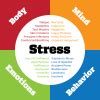Stress is an inevitable part of life, and while it can serve as a motivator in small doses, chronic stress can have severe and far-reaching consequences on both physical and mental health. The effects of stress are multifaceted, impacting various systems of the body and aspects of an individual's well-being. From altering mood and cognitive function to affecting the cardiovascular system and immune response, stress touches nearly every facet of health. Understanding the ways in which stress hurts can provide valuable insights into the importance of managing and mitigating its effects.
Key Points
- Stress can lead to mood disorders, including anxiety and depression.
- Chronic stress is associated with an increased risk of cardiovascular disease.
- Stress affects the immune system, making individuals more susceptible to infections.
- It can disrupt sleep patterns, leading to insomnia and other sleep-related disorders.
- Stress impacts cognitive function, affecting memory, concentration, and decision-making abilities.
- It can influence eating habits, potentially leading to obesity or malnutrition.
- Stress has a negative impact on skin health, exacerbating conditions like acne, psoriasis, and eczema.
The Psychological Impact of Stress

One of the most immediate and noticeable effects of stress is its impact on mental health. Chronic stress can lead to the development of mood disorders, with anxiety and depression being two of the most common conditions. These disorders can significantly affect an individual’s quality of life, influencing relationships, work performance, and overall well-being. The psychological toll of stress can also manifest as irritability, mood swings, and a general feeling of being overwhelmed, making everyday tasks seem insurmountable.
Cognitive Function and Stress
Beyond its psychological impact, stress also affects cognitive function. It can impair memory, reduce concentration, and hinder decision-making abilities. These effects can be particularly detrimental in professional and academic settings, where the ability to focus and make sound judgments is crucial. Furthermore, stress can lead to burnout, a state of emotional, mental, and physical exhaustion caused by excessive and prolonged stress.
| Stress Effects | Physical and Mental Health Implications |
|---|---|
| Cognitive Impairment | Reduced productivity, increased risk of accidents, decreased problem-solving skills |
| Cardiovascular Disease | High blood pressure, heart attacks, strokes |
| Immune System Suppression | Increased susceptibility to infections, slower recovery from illnesses |

Physical Health Consequences of Stress

The physical health consequences of stress are just as concerning as the psychological ones. Chronic stress is associated with an increased risk of cardiovascular disease, including high blood pressure, heart attacks, and strokes. Stress also affects the immune system, making individuals more susceptible to infections and potentially slowing recovery from illnesses. Furthermore, stress can disrupt sleep patterns, leading to insomnia and other sleep-related disorders, which in turn can exacerbate the negative effects of stress.
Nutrition, Stress, and Skin Health
In addition to its impact on mental and physical health, stress can influence eating habits, potentially leading to obesity or malnutrition. Stress eating, or consuming high-calorie, high-fat foods in response to stress, is a common phenomenon. Moreover, stress has a negative impact on skin health, exacerbating conditions like acne, psoriasis, and eczema. The skin, being the body’s largest organ, reflects overall health, and stress can lead to a range of dermatological issues.
In conclusion, the effects of stress are far-reaching and multifaceted, impacting psychological well-being, cognitive function, physical health, and overall quality of life. Recognizing the various ways in which stress hurts is the first step towards managing its effects. By implementing stress management techniques and adopting a holistic approach to health, individuals can mitigate the negative impacts of stress and cultivate a healthier, more resilient life.
What are the primary psychological effects of stress?
+The primary psychological effects of stress include anxiety, depression, irritability, and mood swings. Chronic stress can lead to the development of mood disorders, significantly affecting an individual’s quality of life.
How does stress affect cognitive function?
+Stress can impair memory, reduce concentration, and hinder decision-making abilities. These effects can be detrimental in both professional and academic settings, leading to reduced productivity and increased risk of errors.
What are some effective stress management techniques?
+Effective stress management techniques include meditation, exercise, seeking social support, and maintaining a balanced diet. Implementing these strategies can help mitigate the negative effects of stress on both physical and mental health.



